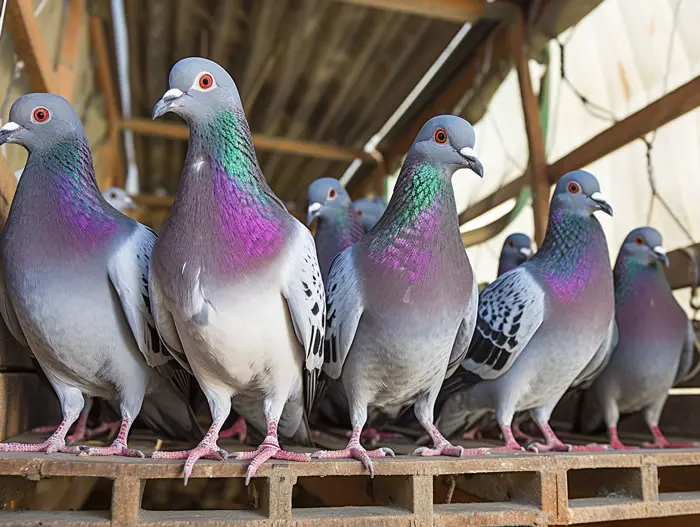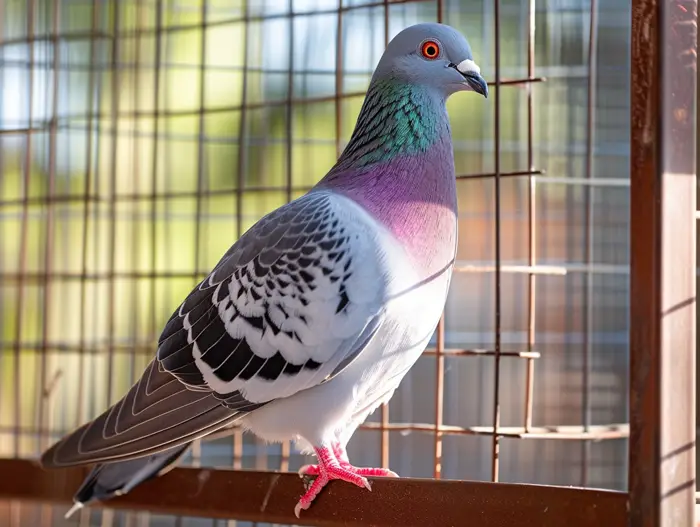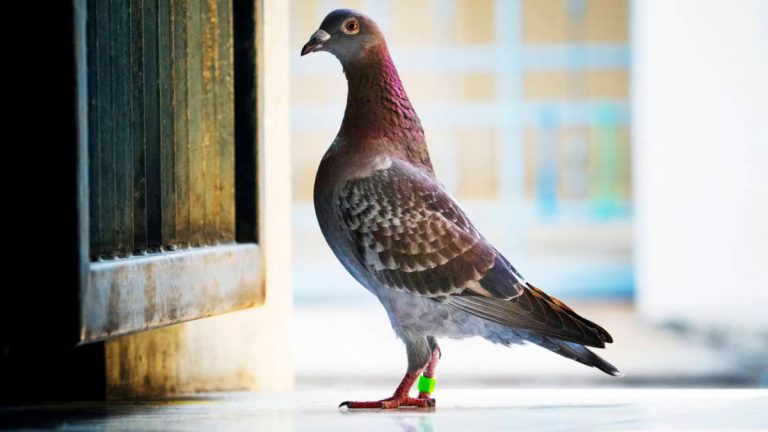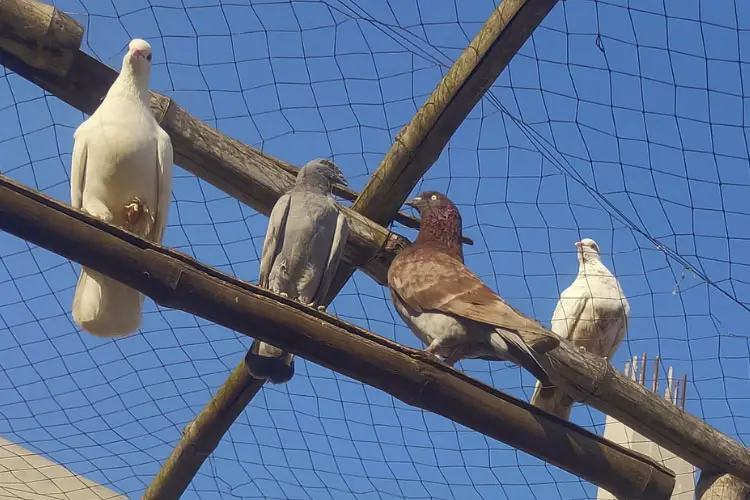Pigeon Lineage Tracking and Record Keeping
Keeping accurate records and tracking the lineage of pigeons may seem like an unusual task to some, but for passionate pigeon fanciers like myself, it is an essential part of the hobby. As a seasoned pigeon breeder, I have come to appreciate the importance of meticulous record keeping and lineage tracking in maintaining the health, performance, and pedigree of these remarkable birds. In this article, I will share my insights and expertise on the subject, highlighting the significance of record keeping and lineage tracking for pigeon enthusiasts.
When it comes to breeding and racing pigeons, having a comprehensive record of each bird’s history is crucial. Not only does it allow breeders to track the performance and genetic traits of their pigeons, but it also helps in making informed breeding decisions. By maintaining detailed records of breeding pairs, hatch dates, training schedules, and racing results, pigeon fanciers can identify successful bloodlines and optimize their breeding programs for success. Whether you are a beginner or an experienced pigeon fancier, understanding the importance of record keeping and lineage tracking is paramount to achieving your goals in the world of pigeon racing and breeding.
In the following sections, I will delve deeper into the specific benefits of record keeping and lineage tracking for pigeons. From improving breeding programs to identifying potential health issues, these practices provide invaluable insights that can help pigeon enthusiasts reach new heights in their endeavors. So, if you’re ready to take your pigeon hobby to the next level, join me as we explore the fascinating world of record keeping and lineage tracking for pigeons.
The Significance of Record Keeping for Pigeon Enthusiasts

Record keeping plays a vital role in the world of pigeon racing and breeding. As a pigeon enthusiast myself, I understand the importance of maintaining accurate and detailed records. Let me explain why record keeping is crucial for us.
- Tracking Performance and Genetic Traits: By documenting the breeding pairs, hatch dates, training schedules, and racing results, pigeon breeders can keep track of the performance of their pigeons. These records allow us to identify the best performing pigeons and the genetic traits that contribute to their success. With this information, breeders can make informed decisions when choosing which pigeons to breed, leading to the production of top-quality racing pigeons.
- Optimizing Breeding Programs: Accurate records help breeders optimize their breeding programs. By analyzing the data, we can identify patterns and trends in the performance and genetic traits of our pigeons. This allows us to selectively breed pigeons that possess the desired traits and improve the overall quality of our racing team.
- Identifying Potential Health Issues: Detailed records enable breeders to closely monitor the health of their pigeons. By identifying any changes in performance, we can quickly detect potential health issues and take timely action. This helps in preventing the spread of diseases and maintaining the well-being of our pigeons.
- Improving Breeding Programs: Lineage tracking, which is closely connected to record keeping, allows breeders to trace the origins of their pigeons. This information is essential for understanding the genetic background of the pigeons and making informed breeding decisions. By keeping track of the lineage, breeders can avoid inbreeding and maintain genetic diversity, which is crucial for a successful breeding program.
As pigeon enthusiasts, record keeping and lineage tracking provide us with valuable insights into the performance, genetic traits, and health of our pigeons. By maintaining accurate records, we can optimize our breeding programs, produce top-quality racing pigeons, and ensure the well-being of our feathered friends. Remember, success in pigeon racing starts with meticulous record keeping.
The Importance of Lineage Tracking in Pigeon Breeding
In pigeon breeding, understanding the lineage or genetic background of pigeons is crucial. Lineage tracking allows breeders to make informed decisions to enhance the breeding program and prevent issues like inbreeding. Let me explain why lineage tracking is so important in pigeon breeding:

- Genetic diversity: By keeping track of the lineage, breeders can ensure that there is enough genetic diversity in their breeding program. This diversity helps maintain the overall health and vigor of the pigeons. Breeding closely related pigeons can increase the risk of genetic disorders and reduce the overall performance of the flock.
- Predicting traits: Lineage tracking provides valuable insights into the genetic traits passed down from generation to generation. By observing the performance and characteristics of previous generations, breeders can predict certain traits in offspring. This allows for strategic pairings that can enhance desired characteristics such as speed, endurance, intelligence, and beauty.
- Avoiding inbreeding: Inbreeding, where close relatives are bred together, can lead to a higher probability of genetic disorders and reduced breeding performance. Lineage tracking helps identify potential inbreeding situations, allowing breeders to make alternative breeding arrangements to maintain the health and vitality of the flock.
- Resolving health issues: Keeping track of the lineage can help identify potential health issues that may be prevalent within a certain bloodline. By monitoring the lineage and identifying patterns or occurrences of specific health conditions, breeders can take proactive measures to minimize the risk of spreading such issues to future generations.
- Record validation: Lineage tracking provides a means of validating the accuracy of records. When breeders have complete and accurate lineage information, they can cross-reference it with other data, such as racing performance or training results. This ensures the integrity of the records and aids in making informed decisions.
Lineage tracking is an essential aspect of successful pigeon breeding. It helps maintain genetic diversity, predicts traits, prevents inbreeding, identifies health issues, and validates records. By carefully managing the lineage of their pigeons, breeders can optimize their breeding programs and ensure the overall well-being and success of their flock.
The Benefits of Accurate Record Keeping for Pigeon Performance
When it comes to pigeon racing and breeding, accurate record keeping plays a crucial role in ensuring success. As a pigeon enthusiast, I know firsthand the numerous benefits that come with keeping detailed records of breeding pairs, hatch dates, training schedules, and racing results. In this section, I will highlight the key advantages of diligent record keeping in enhancing pigeon performance.

1. Tracking Performance: By maintaining accurate records of racing results, I can easily track the performance of each pigeon in my loft. This allows me to identify the top performers and make informed decisions when selecting birds for future races.
2. Optimizing Breeding Programs: Accurate records enable me to trace the lineage of each pigeon and assess its genetic traits. This information is invaluable when it comes to making informed breeding decisions. I can identify pigeons with desirable characteristics and pair them strategically to optimize the genetic potential of the offspring.
3. Monitoring Health: Record keeping also helps me monitor the health of my pigeons. By noting any changes in behavior, weight, or appetite, I can quickly detect potential health issues. This allows me to take prompt action and provide the necessary care to ensure the well-being of my birds.
4. Identifying Patterns: With detailed records, I can identify patterns in breeding, training, and racing that contribute to consistently successful outcomes. For example, I can track the performance of certain bloodlines or identify specific training methods that yield the best results. This information allows me to fine-tune my strategies for even better performance in the future.
5. Enhancing Genetic Diversity: Accurate lineage tracking helps prevent inbreeding, which can have detrimental effects on the health and performance of the pigeons. By keeping records of the pigeons’ ancestors, I can ensure that I pair birds with diverse genetic backgrounds, maintaining a healthy and robust gene pool.
6. Predicting Traits: By studying the lineage and performance records, I can make educated predictions about the traits that offspring are likely to inherit. This knowledge enables me to select breeding pairs strategically, increasing the chances of producing pigeons with the desired traits, such as speed, endurance, or navigation skills.
The Role of Lineage Tracking in Optimizing Pigeon Breeding Programs

When it comes to optimizing pigeon breeding programs, lineage tracking plays a crucial role. By keeping detailed records of the genetic background and performance of our pigeons, we can make informed decisions that lead to better breeding outcomes. Let’s explore the importance of lineage tracking in more detail:
- Maintaining Genetic Diversity: Lineage tracking allows us to ensure that our pigeon population maintains a diverse gene pool. By examining the lineage of our pigeons, we can identify potential areas where genetic diversity is lacking. This knowledge helps us strategically plan our breeding pairs and introduce new pigeons to avoid inbreeding.
- Predicting Traits: Lineage tracking provides valuable insights into the traits that are passed down through generations. By analyzing the performance, physical attributes, and racing results of previous generations, we can make educated predictions about the traits that future offspring are likely to inherit. This helps us breed pigeons with desired characteristics, such as speed, endurance, or specific color patterns.
- Avoiding Inbreeding: Inbreeding can lead to a decline in overall health and performance of our pigeons. By accurately tracking lineages, we can identify potential instances of close breeding and ensure that we introduce new birds with unrelated lineage to our breeding program. This proactive approach prevents the negative effects of inbreeding and helps maintain the vitality of our flock.
- Resolving Health Issues: Lineage tracking can also be a valuable tool in identifying and resolving health issues within our pigeon population. By tracking the lineage of pigeons that show signs of illness or susceptibility to certain diseases, we can recognize patterns and take appropriate measures to address these issues. This helps us maintain the overall well-being of our birds and prevent the spread of diseases.
- Validating Records: Accurate lineage tracking acts as a verification system for our records. By cross-referencing breeding pairs, hatch dates, and racing results with lineage information, we can ensure the reliability of our data. This validation process adds credibility to our records and enhances the accuracy of our breeding program.
Lineage tracking is a vital component of optimizing pigeon breeding programs. It enables us to maintain genetic diversity, predict traits, avoid inbreeding, resolve health issues, and validate records. By embracing meticulous record-keeping practices and leveraging the power of lineage tracking, we can achieve success in pigeon racing and breed pigeons that excel in various attributes.
Identifying Potential Health Issues Through Record Keeping and Lineage Tracking
As a pigeon enthusiast, I find that one of the most important aspects of record keeping and lineage tracking is the ability to identify potential health issues in our pigeons. By maintaining meticulous records of their health, behavior, and breeding history, we can spot red flags early on and take necessary actions to ensure the well-being of our feathered friends.

Monitoring Health Patterns
By keeping detailed records of the health status of each pigeon, including any signs of illness, treatments given, and their response to those treatments, we can start to identify patterns that may indicate potential health issues. For example, if we notice that a particular lineage has a higher incidence of respiratory problems, we can take precautionary measures to minimize the risk of infection or seek appropriate veterinary care.
Genetic Factors
Lineage tracking plays a crucial role in understanding the genetic background of our pigeons. With this knowledge, we can anticipate certain health conditions that may be more prevalent within specific bloodlines. This allows us to be proactive in preventing or managing these conditions effectively. By avoiding inbreeding and promoting genetic diversity, we can minimize the risk of inheriting genetic disorders.
Early Intervention
Effective record keeping and lineage tracking enable us to pick up on abnormalities or changes in our pigeons’ behavior or performance. By having a comprehensive overview of their genetic traits, we can identify any deviations from the norm and take the necessary steps to address them. Early intervention is key, as it can prevent minor issues from developing into more significant health problems.
Validation and Data Analysis
Maintaining accurate records and tracking the lineage of our pigeons ensures the reliability and validity of the data we collect. This is invaluable when it comes to assessing their overall health and detecting any potential issues. By analyzing this data, we can identify any trends or correlations that may suggest health-related patterns within specific bloodlines, further optimizing our breeding programs and promoting the well-being of our pigeons.
Record keeping and lineage tracking provide us with the opportunity to identify potential health issues in our pigeons. By monitoring health patterns, understanding genetic factors, intervening early, and validating our data, we can maintain the health and vitality of our pigeons. These practices are not only essential for the well-being of our feathered friends but also contribute to the success of our pigeon breeding endeavors.
Conclusion
In the world of pigeon racing and breeding, meticulous record keeping and lineage tracking are the keys to success. By maintaining accurate records of breeding pairs, hatch dates, training schedules, and racing results, pigeon enthusiasts can track the performance and genetic traits of their birds. This information allows them to make informed breeding decisions and optimize their breeding programs.
Lineage tracking is equally important in pigeon breeding. It helps breeders understand the genetic background of their pigeons, ensuring that they maintain genetic diversity and avoid inbreeding. By predicting traits, resolving health issues, and validating records, lineage tracking plays a crucial role in maintaining the well-being and performance of the birds.
Furthermore, record keeping and lineage tracking enable pigeon breeders to identify potential health issues, monitor health patterns, and intervene early. This not only ensures the well-being of the pigeons but also helps breeders validate their data and make data-driven decisions.
Meticulous record keeping and lineage tracking are essential practices for pigeon enthusiasts. They provide valuable insights into the performance, genetic traits, and health of the birds, ultimately leading to success in pigeon racing and breeding.






